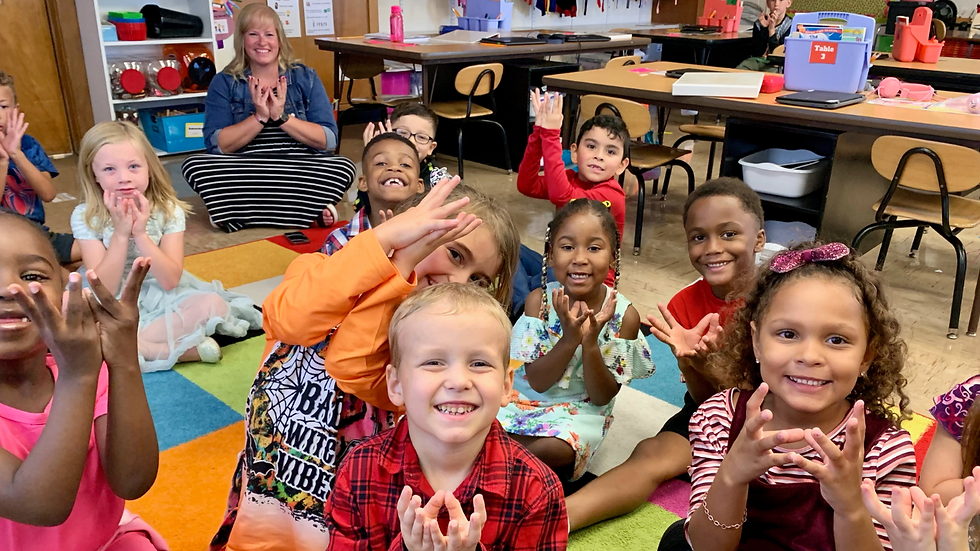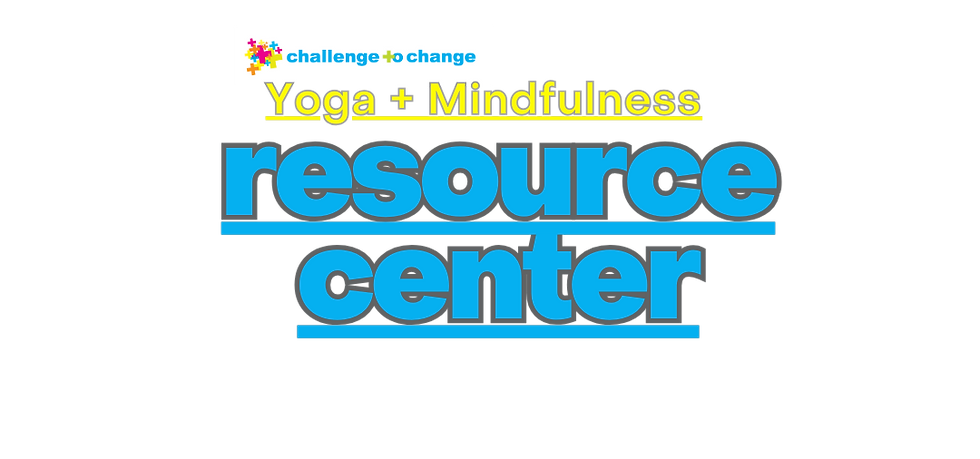How to Use a Mindfulness Calendar at Home or in the Classroom
- Sherrie Collins
- Oct 6, 2023
- 4 min read
Written by Sherrie Collins, Continuing Education Instructor + Yoga Teacher

"Reminding youth the power that they have to think more positively can potentially soften some of the growing pains many of us experienced as children, teens and young adults." - Grow: Tending to the Hearts and Minds of Children
As we are settling into our school year, I look around at classrooms getting used to new routines and habits, following expectations in various parts of the buildings and grounds, and students moving throughout the school day with more confidence and understanding.
This takes me back to my days as a teacher.
I remember that feeling of pride and accomplishment as my students held their heads a little higher and that sense of relief they felt when they could trust what was happening (and how it was happening) through the day.
As a yoga teacher, I see these same things in my classes, both with adults and kids.
When someone begins their journey on the mat, it can seem awkward, slow, and sometimes frustrating.
Over time, I see confidence building and they find that space of comfort on the mat.
I wish, back in my teaching days, that I had the knowledge I have now -about mindfulness, movement, and the breath - so I could have made that transition easier for my students.
Making Time for Mindfulness
I was lucky enough, during my years as an interventionist and coach, to be able to provide these practices to students in the school I was working in.
I used mindfulness as a tool to connect our minds and bodies to build an understanding and awareness of ourselves.
The students (and adults) embraced these practices and saw the benefits.
Just as mindfulness in yoga classes can allow us to feel more grounded and in tune with ourselves, building mindfulness routines for students at school can help them manage stress, improve focus, and develop emotional regulation skills.
One way I have approached this is through a routine that you may already have in place; Morning Meetings, Daily Check-Ins, and/or Circle Time.
In the classroom, bringing students together for one purpose (such as your morning meetings) can create community, and build connections in your classroom.

At home, these times can be beneficial to slow down and build that sense of togetherness.
As a parent/guardian, you may have a daily routine that will fit in as well (such as the ride to school or right before bed).
These are great times to introduce mindful breathing, a gratitude practice, or a body scan.
Using this time to establish self-regulation strategies can only add to these benefits!
One tool I have found extremely useful is our Monthly Mindfulness Calendars.
Ways to Use a Mindfulness Classroom
As a teacher, I have used these calendars in so many ways because they provide a variety of tasks and questions that can be implemented across content and topics.
Here are a few ways I have used these calendars:
With individual students: As part of the Check-In/Check-Out process I have asked students to choose which day they want to talk about, complete, or journal about. When it is completed we simply cross off the day! Some months we complete the whole calendar and other months we don’t…both are okay! I also allow students to take the calendars home (either to share with family or to use outside school). It is a great way to support kids in seeing how these practices and tools benefit us both in and out of school.
With small groups: I have used days of the calendars as sentence stems for writing and discussion starters, and I have used the calendars to build a welcoming routine to begin groups and even a “reward” after we have completed our learning for that session.
In large group classroom instruction, or in a grade/content classroom, this is a great tool to use in one of the routines I mentioned earlier (Morning Meetings, Circles, or Check-Ins/Outs) because it allows for a place to start, or end, that routine. I love the flexibility of the calendar in that you can follow it day to day, giving students the option to complete weekend tasks on the calendar at home. You can also jump around the calendar when you find another task or topic that may be more timely to a situation.
Other Ways to Use a Mindfulness Calendar
A few other ideas for how to use these calendars that span across settings are:
To use them to spark journal topics before your child goes to sleep
As a routine to embed first thing in the morning (or after school).
Conversation starters that can build connections in households or groups of people (such as an after-school program or sports team).
With days that state things like, “Practice Mindful breathing”, it can be helpful to ask questions before or after, such as “How did that make you feel?” or “Why do you think it is called ‘mindful’ breathing?”.
Expand on journal topics or ask questions for verbal responses instead of written ones.
Giving your new routine a name (at home) or seeing who completes the most days of all those in the household.
There are many great ways to bring a routine of mindfulness into your life (and the lives of others) and our Mindfulness Calendars are just one way to do that.
It’s important to remember, as you build these practices, that it takes time, patience, and ongoing effort, but it’s worth it when we know It can have such a positive impact on students' well-being, academic performance, and overall development.
We would love to hear how you have (or will!) use these calendars to promote connection and community!
Peace,
Sherrie Collins

P.S. Have you heard about our Yoga + Mindfulness Resource Center?
You’ll find access to ALL of our best yoga and mindfulness resources - all in ONE convenient place!
- Breathing practice instructional videos and card decks for calming, focus and energy
- Movement videos and yoga sequences
- Guided mindfulness audio tracks
- Mindful games + social-emotional learning worksheet Printables
- Teacher self-care practices and in-services
It’s the one-stop shop for classrooms, learning communities, daycares and homeschoolers!
Learn more and sign up: https://grow.challengetochangeinc.com/p/general-resources




Kommentare